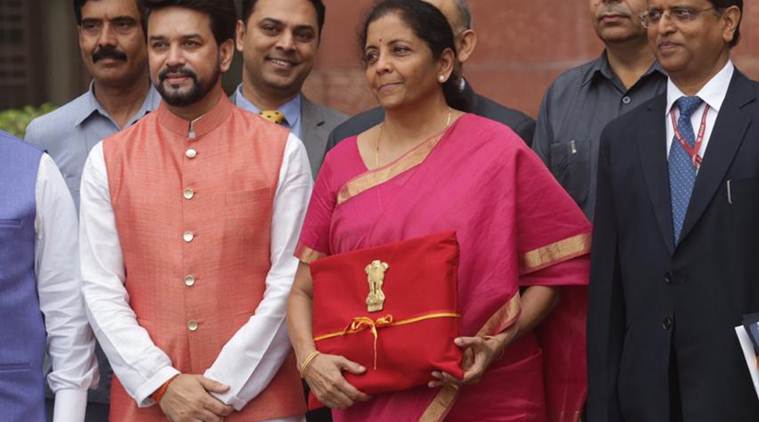Nirmala Sitharaman breaks tradition, carries Budget in red cloth instead of briefcase
Chief Economic Advisor Krishnamurthy Subramanian said, "It is in Indian tradition. It symbolizes our departure from slavery of Western thought. It is not a budget but a 'bahi khata' (ledger)."
 Union Budget 2019: Finance Minister Nirmala Sitharaman outside Parliament on Friday. (Express photo/Neeraj Priyadarshi)
Union Budget 2019: Finance Minister Nirmala Sitharaman outside Parliament on Friday. (Express photo/Neeraj Priyadarshi)
In a break from the British-era tradition, Finance Minister Nirmala Sitharaman arrived in Parliament Friday with the documents of Union Budget 2019 wrapped in a red cloth tied with a string instead of carrying them in a briefcase. The red folder also had the national emblem emblazoned on it.
Red clothes are usually used to cover religious texts.
Follow Union Budget 2019 Live Updates here.
Chief Economic Advisor Krishnamurthy Subramanian called it a sign of “departure from slavery of Western slavery”.
“It is in Indian tradition. It symbolizes our departure from slavery of Western thought. It is not a budget but a ‘bahi khata’ (ledger),” he was quoted as saying by ANI.
#WATCH Delhi: Parents of Finance Minister Nirmala Sitharaman – Savitri and Narayanan Sitharaman – arrive at the Parliament. She will present her maiden Budget at 11 AM in Lok Sabha. #Budget2019 pic.twitter.com/Wp3INz7ifN
— ANI (@ANI) July 5, 2019
While the tradition of carrying the Budget in a briefcase has been on since the British-era, Finance Ministers have chosen to carry the document in suitcases of different colours like red velvet, black and even tan.
As Sitharaman delivers her maiden Budget, the twin challenges for Sitharaman are to spur growth and create more jobs.
Follow Union Budget 2019 Explained.
The Budget is being presented at a time when unemployment touched a 45-year high, and India had lost its tag as the world’s fastest-growing major economy to China in the last quarter of the fiscal year. In the backdrop of BJP’s historic mandate in the recent Lok Sabha polls, the citizens are hopeful that the full-year Budget would further expand the welfare measures announced in the interim Budget. But with India’s economic growth faltering since February 1, it would likely be much more difficult to come through on those promises.
In the Economic Survey presented to Parliament Thursday, the government projected the economic growth to inch up to 7 per cent. It also laid emphasis on private investment and accelerating the GDP growth rate to 8 per cent to turn India to turn into a $5-trillion economy by 2025.



- 01
- 02
- 03
- 04
- 05




























